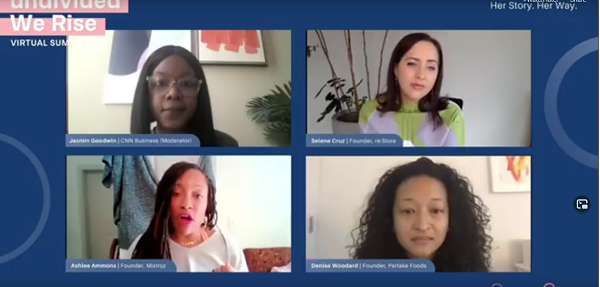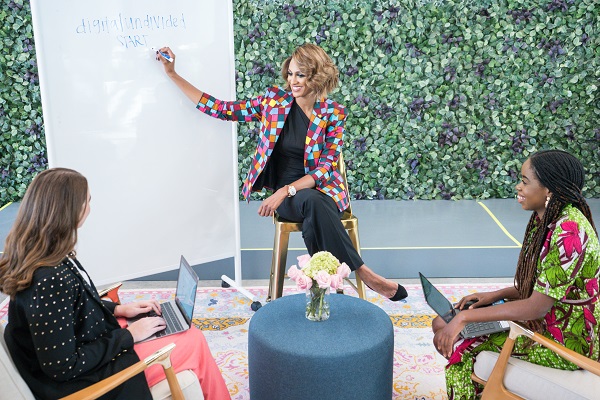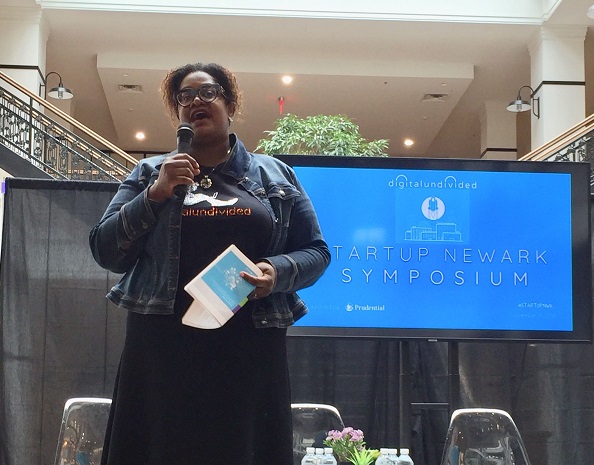Black and Latinx Women Who’ve Raised More than $1 Million Give Advice At Digitalundivided Conference
The Newark-based nonprofit digitalundivided, which offers a pre-accelerator for Black and Latinx female startup founders, and is known for its ProjectDiane reports, held a virtual summit called “undivided We Rise” earlier this month.
The event featured speakers and panels on issues familiar to minority women founders. The video, with more than three hours of content, can be found here.
NJTechWeekly.com took in one of the sessions, called “Journey to $1MM: Her Story. Her Way,” in which three women startup founders who had raised more than $1 million in investments from VCs shared their experiences with the audience, and explained how they became successful despite the many obstacles facing them.
The panel was moderated by Jazmin Goodwin, an associate writer at CNN Business, who asked the panelists what their journey to $1 million looked like.
Moving Goal Posts
Denise Woodard, founder and CEO of Partake (Jersey City), which offers a line of nationally distributed allergy-friendly snacks inspired by her daughter’s experiences with food allergies, said that she was continually challenged to show really positive business metrics, so she could attract investors, while also having to spend all day, every day, fundraising. She was always justifying her business, answering questions about why the category was too big, too crowded or not big enough. She had to explain why she didn’t have a team, which she couldn’t afford.
“The people who know their business, and know their numbers and are building something that’s sustainable are the ones that succeed.”Denise Woodard, Partake
“I think the goal posts continued to move,” with investors telling her to come back when the company had $1 million in revenue, or $2 million, or when the products were in a certain number of stores, and the number of stores kept changing, she said.
Ashlee Ammons, cofounder and president of Mixtroz (Birmingham, Ala.), creators of event management software, noted that she had formed the company with her mom. It’s a technology company, yet neither of them had any formal technology training. She described the difficult process she went through trying to find developers to do what they needed to get done, and advised other women founders to realize that it takes a long time to create a business. She and her mom came up with the idea for Mixtroz in 2014, but did not raise a significant round of funding until 2018.
Finding the Right Ecosystem
Ammons said that things shifted for her when she left Nashville for Birmingham. Nashville just wasn’t the right tech ecosystem for the company. People in Nashville would say., “You’re black, you’re female, you’re nontechnical. You want to start a tech company which isn’t in music or healthcare, which is the ecosystem here. Your mom’s not a millennial.” So, she and her mom took it upon themselves “to find a place that thought differently, and that place for us was Birmingham.” Ammons advised other founders to find a place that “gets you.”
Selene Cruz is a serial entrepreneur who founded the direct-to-consumer handbag brand Archer Brighton (San Francisco); then founded the Retail-as-a-Service flagship Re:store (San Francisco), which was acquired by b8ta (San Francisco); and now is working on Knocknock.TV, a San Francisco-based COVID-19 initiative that helps retailers livestream what’s in their stores during the pandemic. She noted that when she first came to San Francisco, she realized that the company itself almost didn’t matter. Networking did.
Building a Network
“To me, my biggest finding was how important it was to build a network, and also how long that takes. It’s like cultivating a new friends group.” She added that now that she’s working on her new company, and though she has some successes already under her belt, she still has to go out and meet people. “Essentially, you are selling to everyone.” She noted that she doesn’t have those networks ready made. Cruz was originally from Miami, not the Bay Area and didn’t go to school at Stanford, she said, implying that this put her at a disadvantage.
She added that one of the things she had learned in San Francisco was that the Miami culture wouldn’t cut it there. When she hit a stumbling block, she learned to work even harder to overcome it. She also had to allow herself to fail a lot, but failing was something she took personally, so it was a mental challenge to give herself permission to fail.
Some additional advice:
- Cruz: Find your community and the space that supports what you are working on. Cruz, who has lived in multiple cities, said that people thought she was pursuing entrepreneurship because she couldn’t get a real job. If you are in a place that doesn’t understand what you are doing, it will be hard to be successful in that space. Also, she added, you must find the people who will support your unique journey, as well. For example, she made a lot of contacts through groups for Latino business people.
- Ammons: If you are an entrepreneur, something on this journey is going to be uncomfortable, so it’s much better if you understand it is coming and embrace it. For example, your household budget is going to change, and you will start to think differently about your finances. You are going to think differently about your time and where you are spending it. Understand that you are going to have to say no to things. “You are going to have to cut some things out because you are really trying to make this thing grow, and it needs all of your focus.”
- Ammons: A lot of the most important work that will push your business forward is going to be tedious and behind the scenes. She gave this example: At the time of the panel, Ammons was closing a new funding round, but needed a few more investors. She recalled that she had attended an event and was given a list of 700 investors who had attended the event with her. However, there was no information on how to contact them. She had to investigate each one, make sure they were suitable for her business, and find contact information for them. Then, if the fund was in her space, she reached out and contacted them, explaining who she was. “It yielded great results, but that work was so boring.” And it took up two weeks of her time.
- Woodard: It’s essential to stay positive on the journey, said Woodard, who used to dismiss notions like this. “There are so many hurdles every single day that come your way, so shifting your mindset to one of abundance” is important.
- Woodard: Don’t be afraid to start small. “I used to be so embarrassed because my [pitch] deck wasn’t so professional. I couldn’t afford to pay a designer. I built it in PowerPoint.” Or she’d arrive at an exhibition hall to find that she was next to a beautiful booth, while all she had was a table with a tablecloth. “But I knew my business,” and eventually that’s what mattered. “The people who know their business, and know their numbers and are building something that’s sustainable are the ones that succeed.”




